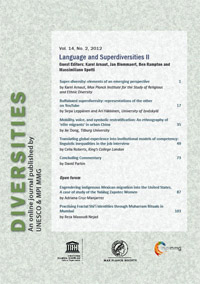Super-diversity: elements of an emerging perspective
by Karel Arnaut (Max Planck Institute for the Study of Religious and Ethnic Diversity)
To cite this article: Arnaut, K. (2012). Super-diversity: elements of an emerging perspective. Diversities, 14(2), 1–16. https://doi.org/10.58002/zhbh-5j97
This paper is an attempt to reflect upon diversity in contemporary globalising society from within the disciplinary frontier of anthropology and sociolinguistics. Like the paper of David Parkin (infra) Arnaut’s is an attempt to device new frames of reference for the sociolinguistic study of super-diversity. Here Arnaut explores the potential of ‘super-diversity’ as a perspective or lens for looking at diversity as discourse and as social practice. The paper first looks into the notion of super-diversity, which marks a sea-change in the global design of transnationalism. Moreover, super-diversity seems to indicate that a new approach is needed to replace the model of orderly multiculturalism by taking into account the fluidities and complexities of diversity in the age of heightened mobility and digital communication. Second, this paper recognises that over the last two decades a hegemonic ‘diversity’ discourse has emerged in a ‘post-panoptical’ configuration of governmentality that manages these complex forms of diversity. The challenge of the super-diversity perspective is to relate to this hegemonic discourse while not losing track of the exciting dynamics of messy and creative commonplace diversity in every-day interaction and low-key cultural production. In order to perform this task, the paper proposes a ‘critical sociolinguistics of diversity’ that is presented as part of a new moment in the post-colonial history of the human and social sciences, almost half a century after the earlier decolonising moves by scholars such as Johannes Fabian and Dell Hymes.
|
